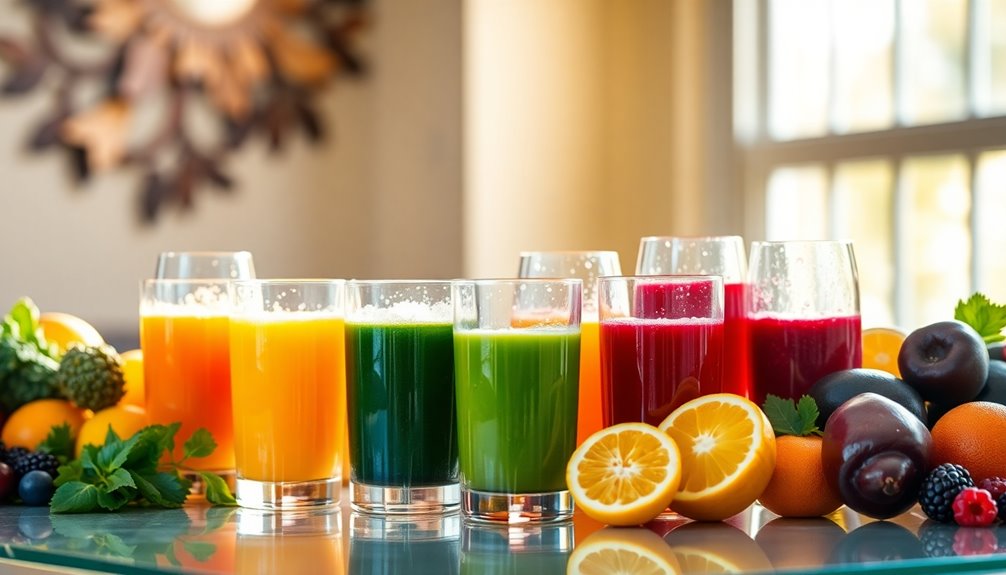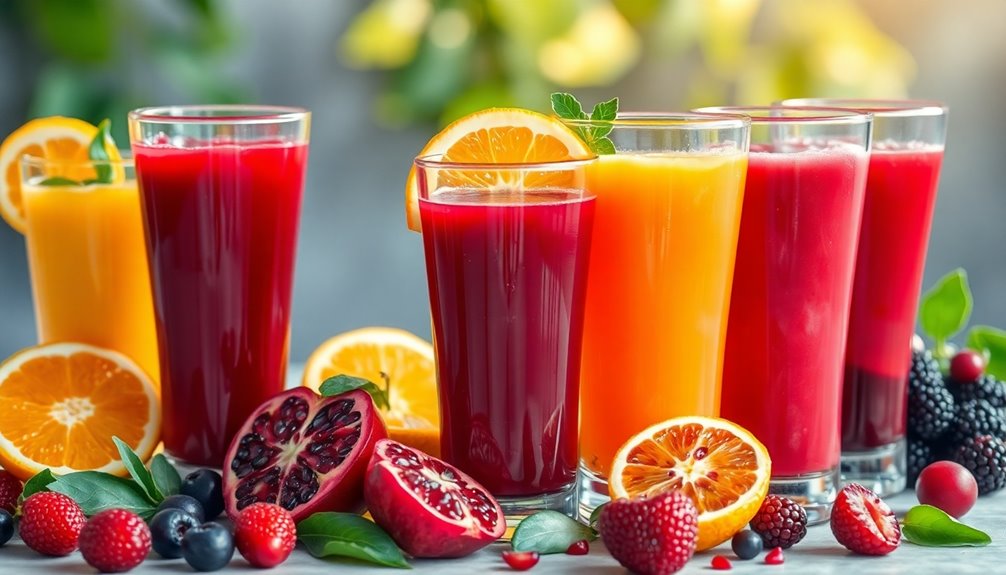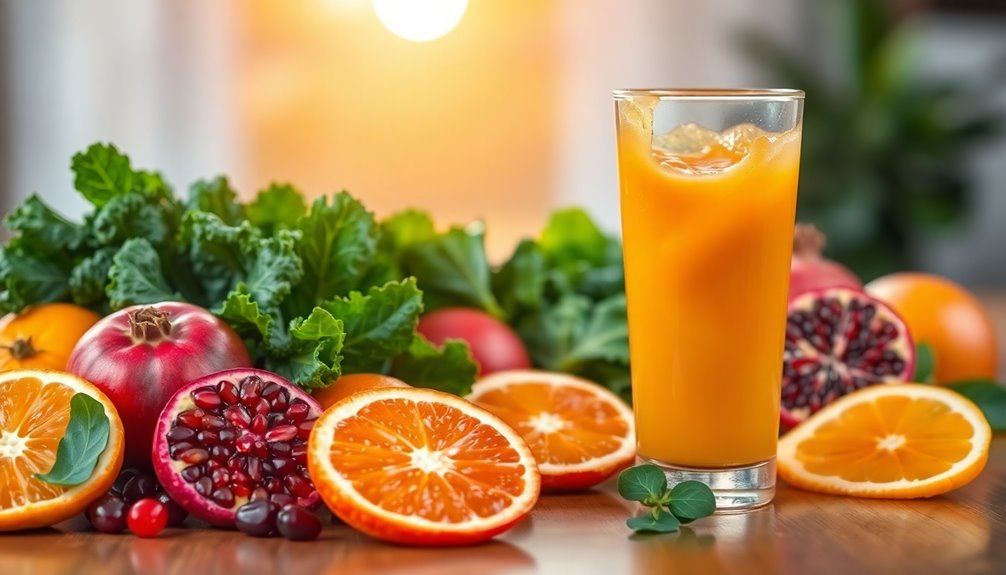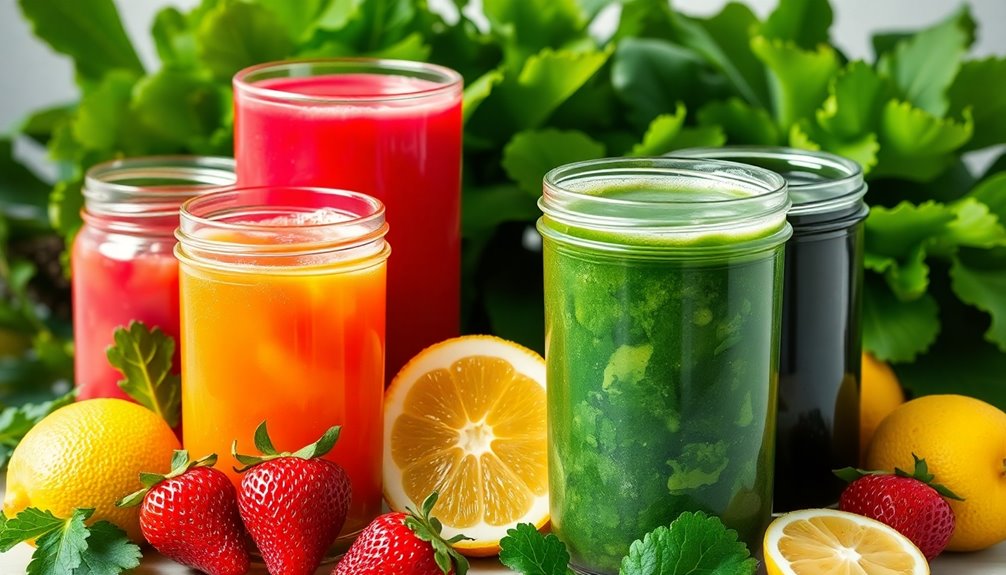Fresh fruit juices are nutritional powerhouses that provide a burst of vitamins, minerals, and antioxidants. When you enjoy fresh orange or pomegranate juice, you're fueling your body with high levels of vitamin C, potassium, and powerful phytochemicals. These nutrients boost your immune system, support digestion, and help your body stay hydrated. Plus, they may lower your risk of chronic diseases. Want to discover even more about how fresh juices can elevate your health? Keep going!
Key Takeaways
- Fresh fruit juices provide a high concentration of vitamins and minerals, particularly vitamin C, crucial for immune health and overall wellness.
- Rich in antioxidants, fresh juices like orange and pomegranate help reduce oxidative stress and lower the risk of chronic diseases.
- Fresh juices support hydration effectively, sometimes surpassing water in hydration benefits, while also aiding digestion with enzymes and fiber.
- Nutrient-rich juices can enhance immune function, with ingredients like ginger and carrot juice offering anti-inflammatory and immune-boosting properties.
- Juicing increases nutrient intake and lowers risks of heart disease and certain cancers, making it a vital part of a healthy diet.
Nutrient Content: A Closer Look at Vitamins and Minerals

When you dive into fresh fruit juices, you’ll discover a treasure trove of vitamins and minerals that can boost your health. These vibrant drinks are not only delicious but also packed with essential nutrients that promote overall well-being. From enhancing your immune system to improving digestion, the nutritional benefits of fruit juices are immense. By incorporating a variety of fruits into your juicing routine, you can maximize these advantages and enjoy a refreshing way to stay hydrated.
For instance, orange juice packs a whopping 137% of your recommended daily intake (RDI) for vitamin C, while fresh oranges offer 116%. Both are excellent sources of folate, providing 11% and 10% of the RDI, respectively. Additionally, juices rich in vitamins A, C, and E promote skin health, making them a great choice for overall wellness.
You'll also find that fresh juices generally contain more potassium, phosphorus, and magnesium than their commercial counterparts. Plus, they lack added sucrose, maintaining a more natural flavor. Furthermore, store-bought orange juice often has reduced vitamin C and folate due to processing, making fresh juice a superior choice.
With a balanced pH, fresh juices are less acidic, making them gentler on your stomach.
Enjoying these juices means fueling your body with essential nutrients while savoring delicious flavors.
Antioxidant Benefits: Protecting Your Cells

Fresh fruit juices not only provide a rich supply of vitamins and minerals but also serve as a powerful source of antioxidants that protect your cells. These compounds inhibit oxidation, helping maintain a balance of free radicals in your body. Juices like orange, grape, and pomegranate are loaded with antioxidants such as vitamin C, flavonoids, and anthocyanins. By consuming these juices, you can reduce oxidative stress and shield your cells from damage. This is crucial, as antioxidants are linked to a lower risk of chronic diseases like cancer and heart disease. Moreover, enjoying these juices can enhance your overall antioxidant capacity, promoting better health and quicker recovery after exercise. Recent studies have shown that orange juice consumption can significantly improve your antioxidant status and lower oxidative stress parameters. Additionally, incorporating meal replacement juices into your diet can further support your nutritional needs while aiding in weight management.
Hydration and Digestion: The Dual Role of Fresh Juices

While many people enjoy fresh fruit juices for their delightful flavors, they also play a crucial role in hydration and digestion. Juices like coconut water and watermelon are packed with electrolytes, helping to keep you hydrated and replenish lost fluids. Additionally, cucumber juice is another excellent option that contains antioxidants and minerals, further supporting hydration. Citrus juices, especially orange juice, can even be more hydrating than water, as they provide a concentrated source of vitamin C. On the digestive front, pineapple juice contains bromelain, which aids digestion, while prune juice offers fiber to support regularity. Aloe vera juice also contributes to digestive health with its rich nutrient profile. By incorporating these juices into your diet, you're not just quenching your thirst; you're also giving your body the hydration and digestive support it craves.
Immune System Support: Strengthening Your Defenses

To bolster your immune system, incorporating fresh fruit juices into your diet is a powerful strategy. These juices are packed with antioxidants that protect your cells from free radical damage. Juices like orange and kiwi strawberry are rich in vitamin C, which is essential for immune function. Carrot juice offers beta-carotene, further supporting your immune health. Adding ginger can help reduce inflammation, enhancing your body's defenses. By regularly consuming these nutrient-rich juices, you stimulate immune cell functions, improving your overall immune response. Furthermore, juicing supplies essential micronutrients that are often missing from the typical American diet. This proactive approach not only strengthens your defenses but also helps in fighting infections. Additionally, many fruit juices are known for their anti-inflammatory properties, which can further support your immune system. So, grab a glass of fresh juice and give your immune system the boost it needs!
Fiber and Blood Sugar Regulation: Maintaining Balance

Maintaining a balanced diet is key not just for immune support but also for regulating blood sugar levels effectively.
Fiber plays a crucial role here, as it slows down the digestion and absorption of sugars, helping to prevent those pesky blood sugar spikes. Aromatherapy sessions can lead to improved mood and emotional well-being, which may also help in managing cravings for sugary foods.
While whole fruits are packed with fiber, fruit juices often lack it, leading to quicker sugar absorption and potential spikes in blood sugar. Recent research indicates that 100% fruit juice does not contribute to disruption of glucose levels, suggesting it can be part of a healthy diet when consumed appropriately.
If you choose to enjoy juice, pair it with protein and fiber-rich foods to balance your blood sugar response.
Remember, moderation is essential—100% fruit juice can be nutritious, but its concentrated sugars can still impact glycemic control.
Prioritize whole fruits for better blood sugar regulation and overall health.
Chronic Disease Prevention: A Shield Against Illnesses

As you incorporate fresh fruit juices into your diet, you can harness their potential to help prevent chronic diseases. These juices are packed with antioxidants that protect your body from oxidative stress and inflammation, reducing your risk of heart disease and certain cancers. Additionally, antioxidants found in coffee can also combat oxidative stress, further enhancing your health when consumed alongside fruit juices.
Phytochemicals found in fruits boost your immune system and offer additional health benefits. Juicing is a convenient way to increase your nutrient intake, especially when whole fruits and vegetables are hard to consume. For instance, apple and pomegranate juices can lower blood pressure and cholesterol levels, while polyphenols in juices may enhance cardiovascular health. Moreover, whole fruits retain fiber and antioxidants lost in juicing, which contribute to lower risks of heart disease and diabetes. By regularly enjoying fresh fruit juices, you're taking a proactive step toward shielding yourself from chronic illnesses.
Frequently Asked Questions
Can Fresh Fruit Juices Replace Whole Fruits in My Diet?
Fresh fruit juices can't fully replace whole fruits in your diet. While they provide some vitamins and are convenient, they lack the fibre that keeps you feeling full and aids digestion.
Juices often have high sugar levels, which can lead to weight gain and blood sugar spikes.
To maintain a balanced diet and support your health, prioritize whole fruits over juices, enjoying them as a nutritious snack or part of your meals.
How Should I Store Fresh Fruit Juices for Maximum Freshness?
Imagine your fresh juice as a vibrant sunset, bursting with colors and flavors.
To keep that brilliance alive, you should store it in glass containers, tightly sealed to lock in freshness.
Keep it in the fridge, ideally at 35-40°F, and consume within 72 hours.
If you want to save it longer, freeze it in small portions.
Are Store-Bought Fruit Juices as Nutritious as Fresh Juices?
Store-bought fruit juices aren't as nutritious as fresh juices. They often undergo pasteurization, which reduces vitamin content, especially Vitamin C.
While they might've similar mineral levels, you'll miss out on the live enzymes and higher antioxidant levels found in fresh options.
Plus, many store-bought juices contain added sugars and preservatives. If you want the best health benefits, it's worth choosing fresh juices whenever you can.
Can I Juice Any Type of Fruit or Are Some Better Than Others?
You can juice many types of fruit, but some are definitely better than others.
Citrus fruits like oranges and grapefruits yield a lot of juice and offer a refreshing taste.
Berries add sweetness and antioxidants, while tropical fruits like mangoes and pineapples provide a delicious flavor.
Melons are hydrating and sweet too.
Just remember, combining different fruits can enhance both taste and nutritional value, so experiment to find your perfect blend!
How Often Should I Consume Fresh Fruit Juices for Health Benefits?
When it comes to fresh fruit juices, you'll want to strike while the iron's hot. Aim for moderate consumption, about 75–150 ml daily, to reap health benefits without overdoing the sugar.
One 8-ounce serving a day can help meet your fruit goals. Remember to balance those juices with whole fruits for fiber and variety, ensuring you keep your diet both nutritious and satisfying.
Enjoy the boost while keeping moderation in mind!
Conclusion
Incorporating fresh fruit juices into your diet isn't just refreshing; it's a smart choice for your health. You're not just boosting your vitamin intake; you're enhancing your antioxidant levels, hydrating your body, and supporting your immune system. You're fueling your energy, regulating your blood sugar, and shielding yourself against chronic diseases. So, enjoy that glass of juice, knowing that every sip brings you closer to a healthier, happier you. Cheers to your wellness journey!
Cindy thoroughly researches juicing trends, techniques, and recipes to provide readers with practical advice and inspiration. Her writing style is accessible, engaging, and designed to make complex concepts easy to understand. Cindy’s dedication to promoting the advantages of juicing shines through her work, empowering readers to make positive changes in their lives through the simple act of juicing.











